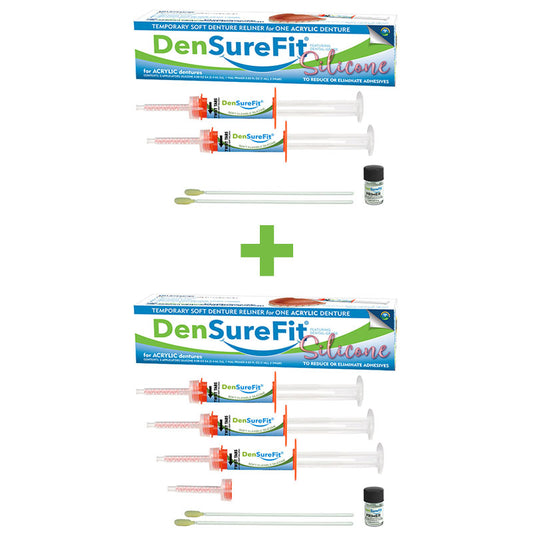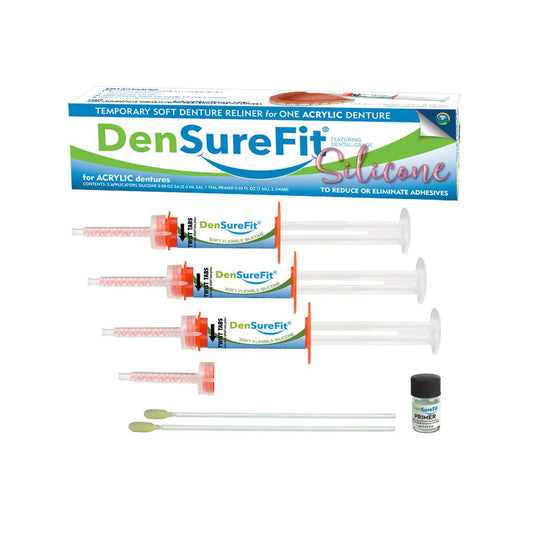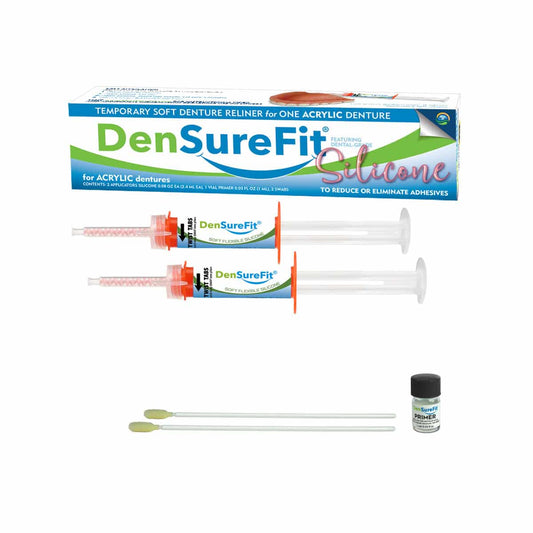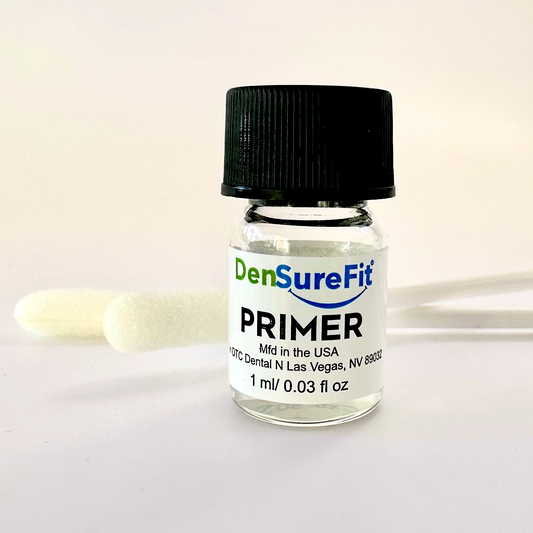
Denture Adhesive Questions from New Denture Wearers
Transitioning from natural teeth to dentures can be a challenging and even traumatic experience. The first few months of wearing dentures can be the hardest because many people don’t know what to expect or how to cope with the inevitable changes. At DenSureFit, we receive many questions about denture adhesives and denture adhesive solutions from new denture wearers. Below, you’ll find answers to many of the common questions we hear.
Common Questions About Denture Adhesives
Do modern dentures need adhesive?
People using today’s immediate/temporary dentures are often disappointed or concerned when they start getting loose. They fear something is wrong when their new dentures suddenly don’t fit correctly. Relax. This is to be expected. Your gums and jaw will change following extractions. This is normal.
The swelling goes down within six to eight weeks of your extractions, and your gums heal. This will make your immediate dentures looser. Your gums and jawline will continue to change and adapt to the absence of natural teeth. This will be most pronounced in the first six to eighteen months following your extractions. You can expect your gums to shrink slightly during this time and experience some bone loss. As a result, your temporary denture will get looser and looser unless the fit is adjusted regularly.
After this initial stage of healing, your dentist will inform you that you are ready for a professional soft reline. Now, consider the more affordable and convenient option of using DenSureFit.
Should dentures stay in without adhesive?
Generally speaking, if dentures are correctly fitted, it is unnecessary to use denture adhesives. But remember, even if your immediate dentures fit when you leave the dentist’s office, they will soon become loose as the swelling subsides and gums recede. And in the following months, your gums and jawline will continue to change.
What is the best thing to hold dentures in place?
Before the invention of DenSureFit, the only viable solutions were powder or paste adhesives to fill the voids or frequent and expensive visits to the dentist. DenSureFit is a game-changing product that can improve comfort and confidence during the challenging transition to wearing dentures. Now, you can apply a soft reline whenever your dentures feel loose. DenSureFit is not an adhesive, but it can drastically reduce or even eliminate the use of adhesives. You only need to apply DenSureFit when you feel your dentures getting loose again.
How many times a day should you apply denture adhesive?
We have found that even the best denture adhesives must be reapplied frequently and are messy. Most powder and cream adhesives are advertised to last up to 12 hours, which is seldom the case. That’s why many denture wearers worry about eating in public. Most denture wearers dislike reapplying denture adhesive in inconvenient places, like a bathroom stall. Situations like that can make denture wearers feel their life revolves around their dentures.
DenSureFit, on the other hand, makes your denture fit like never before. Your custom silicone liner can stay in your denture for months! Guaranteed.
How soon after getting dentures can I use a denture adhesive?
We do not recommend using DenSureFit until after this initial stage of healing. However, when your dentist says you are ready for a professional soft reline, you should consider the more affordable and convenient option of using DenSureFit.
Which is better, powder or cream denture adhesive?
Many denture wearers use powder or cream adhesive to help their smile look and feel more natural. They also want their dentures to stay in place while they eat. Unfortunately, powder and paste adhesives can cause gagging, and many adhesives wash away with hot drinks like tea or coffee. Many denture users have found most adhesives are hard to remove. The gunk gets stuck to the roof of the mouth. DenSureFit, on the other hand, works by providing a cushion layer around the denture.
DenSureFit’s silicone will fill the inside of the denture. It will also rise up the side walls and wrap around the top ridges of the denture to create a soft gel cushion that makes your denture more snug and comfortable. This also creates the suction effect, and the seal keeps food and debris out from under the liner.
With DenSureFit, you can keep up with the changing shape of your gums throughout the transition period while significantly reducing discomfort and excess use of adhesives. Like every step in your denture journey, there can be a learning curve to using DenSureFit effectively. This is why we place a focus on customer service and support. We are happy to help guide you through your initial applications. We are confident that DenSureFit will become an indispensable part of your new life as a denture wearer as soon as you use our do-it-yourself soft-refine system.
Which denture adhesive lasts the longest?
Most powder and cream adhesives are advertised to last up to 12 hours, but most users will tell you they last far less. On the other hand, your DenSureFit custom silicone liner stays in your denture for months. The days of applying, reapplying, and removing cream adhesive are behind you.
What is the Strongest Denture Adhesive on the Market?
Many denture powders and cream adhesives claim to be the longest-lasting. They may last up to 12 hours. Other denture products claim to last up to four days. But DenSureFit is the only denture product that lasts beyond hours or days. DenSureFit lasts months. We’re confident you’ll get a great fit that lasts, and we guarantee it or your money back.




